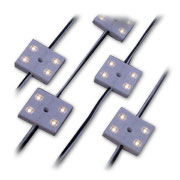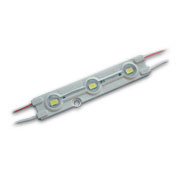Suppliers explore cooling options and materials, and adopt high-power SMD diodes.

|
|
The model HFS-5050xx4-A LED module from Shenzhen Hansen uses 5050 SMD LEDs in red, green, blue, or warm, natural or cool white. It has an IP65 rating. (Global Sources) |
China suppliers of LED modules are enhancing product designs to address the light source’s elevated temperature. They use high-power diodes, mainly 1W SMD units, to achieve greater luminance and boost penetration of the indoor and outdoor illumination markets.
Zhejiang Manelux is tapping a nanocarbon material, which surpasses aluminum alloy in thermal conductivity performance. Heat sinks based on this alternative input weigh one-third and measures half the size of typical aluminum alloy counterparts. The maker, a key local player in the diode and module categories, has patented the technology and is currently undertaking trial production. It owns more than 100 patents covering LED chip packaging, heat sinks, drivers, structural designs, materials and applications.
In addition to these product initiatives, makers turn out water-resistant LED modules to enhance their selections for outdoor applications. Units with an IP65 rating are the bestsellers at present. Such models from Shenzhen Zonke Goode suit tunnel, factory, street and downlights.Shenzhen Zonke Goode Lighting Co. Ltd integrates a vapor chamber in its models. Releases utilize high-power SMD diodes from Cree or Nichia. These come in 30, 45 and 60W versions.
 |
|
Blueview Elec-optic Tech Co.'s IP66-rated model. (Global Sources) |
Blueview Elec-optic Tech Co. Ltd has introduced an IP66-rated model, which is UV- and dust-resistant as well. The module has 5630 SMD diodes, each delivering 105 to 120 lumens, and has a 50,000-hour life span. It can also be used indoors.
Helping makers sustain product development and manufacture are the national standards covering performance and safety requirements, test methods, and terms and definitions. Implemented since 2009, these include the GB24819-2009, GB/T24823-2009, GB/T24824-2009 and GB/T24826-2009.
Companies also benefit from government support for the industry. More than 20 cities have been granted subsidies to install LED streetlights, providing an opportunity for the module segment. The total number of such fixtures is expected to exceed 10 million units by end-2013 from 3 million units in 2009.
There is also the global lighting market, of which more than 20 percent of total production value will be represented by diode-based products by year-end. In 2012, the portion was only at 11 percent.
Besides general and special illumination applications, suppliers are eyeing the expanding backlighting sector. By the year’s end, LED-backlit TVs will own 87 percent of the global market, doubling the share in 2011, according to the Semiconductor Application Union.
Mainland China has about 200 to 300 manufacturers of LED modules, the majority of which also turn out diodes and lighting products. The supplier pool includes foreign-invested operations mostly from Taiwan and Hong Kong, 60 percent of which are in Shenzhen and Dongguan in Guangdong province. The rest of the suppliers are based in the provinces of Zhejiang and Jiangsu.
SMD modules lead supply
SMD units dominate China’s LED module selection, which also includes superflux and through-hole types.
SMD models generally adopt 5050, 3528 or 5630 diodes in natural, warm, cool white or RGB. These have a typical life span surpassing 50,000 hours.
Through-hole kinds employ LEDs in sizes of 3, 5, 8 and 10mm. They are available in red, green, yellow, orange, blue, white or RGB, and last more than 10,000 hours.
Superflux modules come in 3 or 5mm, and have red, green, yellow, orange, blue or white emitted light. They support a life span exceeding 30,000 hours.
Products comply with CE, RoHS and UL requirements.
Suppliers source key materials and components such as LEDs, drivers, aluminum PCBs and heat sinks from local providers, while chips come from foreign companies. They accommodate requests for imported drivers.
Owing to declining input costs, prices were reduced by 10 percent in the past year. The downward trend in quotes is expected to continue at this rate in 2014.





 CN
TW
EN
CN
TW
EN





